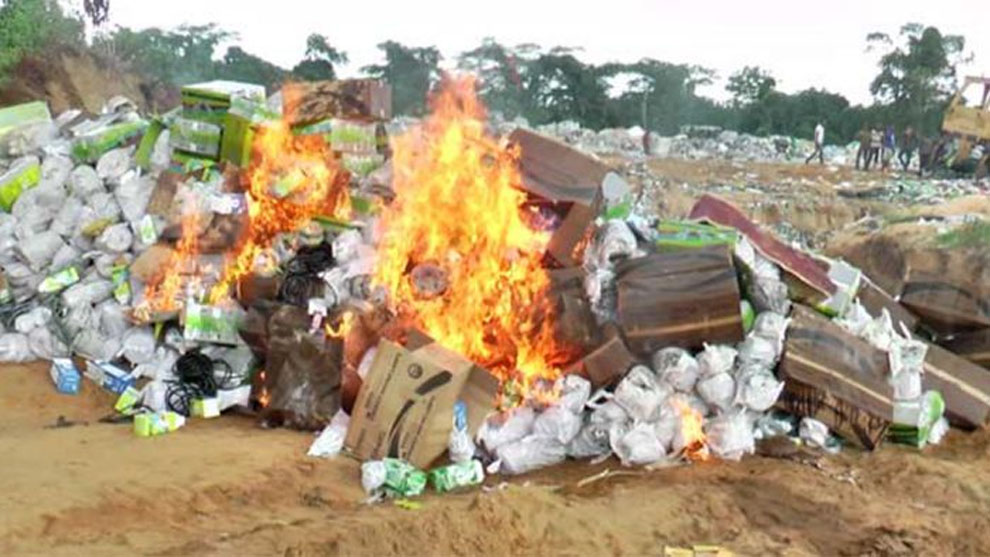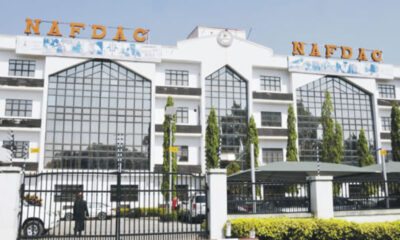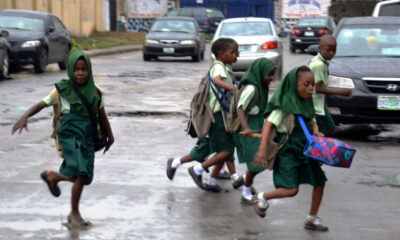Health
Gov Otti opens OSSAP-SDG-built multipurpose hospital in Abia

Gov Otti opens OSSAP-SDG-built multipurpose hospital in Abia
- We’ll achieve SDGs by 2030, says Tinubu aide
Governor of Abia State, Alex Otti, has inaugurated a 100-Bed Mother and Child Centre, a multipurpose hospital built by the Office of the Senior Special Assistant to the President on Sustainable Development Goals (OSSAP-SDGs) in Ugwunabo, Abia State.
The governor, speaking at the event on Wednesday, commended President Bola Ahmed Tinubu for siting the hospital in Abia State.
Otti promised that the facility would be judiciously used, adding that the state was planning to establish a medical village that would put an end to people travelling abroad for medical issues.
He hailed Senior Special Assistant to the President on Sustainable Development Goals, Princess Adejoke Orelope-Adefulire, for her tireless efforts in achieving SDGs.
He pledged the support of Abians for the SDGs’ office and President Tinubu.
Princess Orelope-Adefulire thanked President Tinubu for his sterling leadership and commitment to working closely with sub-national governments to deliver key interventions and fast-track the achievement of the SDGs in Nigeria.
“I would like to most sincerely thank Governor Otti for his unwavering commitment to the socio-economic transformation of Abia State and our collective desire to achieve the SDGs in Nigeria,” she said.
According to her, the SDGs are a universal call to action to end poverty, safeguard the planet and ensure all people enjoy peace and prosperity by the year 2030.
She stressed that the SDGs could not be achieved with standalone policies and programmes.
“They must be carefully integrated into our medium and long-term national and sub-national development policies and plans.
“It is in recognition of this that we are supporting the 36 states and the FCT on SDG-based Development Planning.
“In line with President Bola Tinubu’s Renewed Hope Agenda, we are committed to prioritizing key interventions with multiplier effects on multi-dimensional poverty, such as basic healthcare, vocational skills development and education provisioning.
“With COVID-19 pandemic challenging our healthcare system, strategic interventions, such as the Mother and Child Centre, have become imperative.”
The SSA to the President explained that the 100-Bed Mother and Child Centre (MCC) is equipped with state-or-the-art facilities.
She said, “They include among others two operating theatres, recovery rooms; private and general wards, scanning room, consultation rooms and laboratory.
Others are ultra-scan machine, vacuum extractor delivery set, and an emergency cart with full complements. The MCC is directly linked to the achievement of SDG-3 on ‘Quality Health and Well-being for all’, as well as other cross-cutting SDGs.
“OSSAP-SDGs has worked tirelessly to construct and furnish this state-of-the-art facility as a strategic tool for healthcare service provisioning in the state.
“It is therefore expected that the state and local governments will make judicious use of the facilities in a sustainable way for the benefit of our mothers and children.
“Let me conclude by encouraging us to make this Mother and Child Centre a beacon of hope and a testament to our collective dedication to building healthier and more prosperous communities. May it serve as a reminder that by investing in maternal and child health, we invest in the very foundation of our society’s well-being. Together, let us continue to strive for excellence in healthcare delivery and create a future where every mother and child can thrive.
“I would like to reaffirm our commitment to the achievement of the SDGs by the year 2030. We will continue to prioritize interventions with potential impact on the lives of the poor and vulnerable members of our society so that no ‘Nigerian is left behind’.”
The OSSAP-SDGs also organised a sensitization and advocacy programme for major stakeholders in the state on the acceleration of the SDGs.
Health
NAFDAC destroys N5bn fake, expired products in Aba

NAFDAC destroys N5bn fake, expired products in Aba
The National Agency for Food and Drug Administration and Control (NAFDAC) has shut down 150 shops at Eziukwu Market in Abia over fake and expired products Worth N5 billion.
The agency disclosed this in a statement on Wednesday on X.
NAFDAC said the shops were shut during a two-day operation on December 16 and 17, while products valued at N5billion were destroyed at the market.
The director of the South-East zone, Martins Iluyomade, expressed dismay at the continued illegal activities despite a previous undertaking signed by market leaders in December 2023 to expose counterfeiters.
READ ALSO:
- Speaker Abbas to Tinubu: Your reforms have disrupted status quo
- Abuja demolition: Soldiers attack FCTA officials, seize vehicles
- Onion price rises over 100%, flooding, inflation blamed
According to the statement, Mr Iluyomade described the market as a hub for counterfeit and substandard products.
“Our team uncovered a large-scale production and distribution of fake and expired goods, including beverages, carbonated drinks, wines, spirits, and vegetable oils.
“Revalidated food items such as milk, yoghurt, noodles among others were also destroyed,” the statement said.
It reaffirmed NAFDAC zero tolerance for such practices and emphasised its unwavering commitment to safeguarding public health while working toward a permanent solution to the problem of counterfeiting in the market
NAFDAC destroys N5bn fake, expired products in Aba
(NAN)
Health
Eating fish regularly minimises risk of incurable hearing condition – Study

Eating fish regularly minimises risk of incurable hearing condition – Study
Tinnitus is the sound of ringing in the ears. It may also be described as roaring, buzzing, hissing, or clicking inside the head. The sounds may come and go. Or they may be ongoing. The sounds range in severity from a mild distraction to a disabling condition and may manifest with buzzing, hissing, or clicking inside the head.
The sound may happen in one or both ears and may have different tones. A team from Brigham and Women’s Hospital in Boston studied 73,000 individuals to understand how common this disorder is, which affects millions with a constant ringing in their ears.
Over a span of 30 years, those who consumed more than two servings of fish weekly had nearly 25 percent lower odds of getting tinnitus compared to those who seldom or never ate fish. Even eating just one serving a week resulted in a 13 percent reduced risk.
Certain types of fish, like tuna, light-fleshed varieties such as cod or halibut, and shellfish, were linked to a reduced risk, while darker fish like salmon and swordfish seemed to increase the risk.
READ ALSO:
- No litigation delaying Lekki int’l airport construction, says Lagos govt
- Ondo: Jilted husband kills self, sets wife ablaze
- Military sends Special Operations Brigade to quash Lakurawa terrorists
Interestingly, fish oil supplements, known for their benefits to heart, brain, and joint health, were also connected to a higher risk of tinnitus. It’s estimated that tinnitus is diagnosed in almost 1 in 6 persons.
While age-related hearing loss, ear injuries, and circulation issues are known to contribute to tinnitus, the exact cause remains unclear. Previous studies have suggested that dietary factors, such as high levels of calcium, iron, and fat, might heighten the risk. However, this new research is the first to analyse data over such a lengthy period.
Past findings have also shown that seafood can lower the risk of hearing loss, with one study suggesting that increased fish consumption might reduce hearing issues by up to 20 percent. Scientists believe that the omega-3 fatty acids in fish could protect inner ear cells or reduce inflammation caused by loud sounds, chemicals, or infections.
The Boston team’s investigation, based on a database of US nurses, aims to shed light on the connection between fish consumption and tinnitus, potentially aiding future patients. The authors of the study expressed hope that identifying factors that can be changed might help in preventing tinnitus and guiding targeted treatments.
Eating fish regularly minimises risk of incurable hearing condition – Study
Health
Nigerian doctor claims increased s3xual activity lowers cancer risk for women

Nigerian doctor claims increased s3xual activity lowers cancer risk for women
Dr. Rasheed Abassi, a Nigerian medical practitioner, has sparked widespread debate following comments on TVC’s programme Your View, where he recommended increased sexual activity for women as a way to reduce the risk of breast cancer.
The doctor also advised men to consider polygamy, citing its potential health benefits, including a lower risk of prostate cancer.
“Women need to have more sex to reduce breast cancer risk. When a woman reaches orgasm, she releases oxytocin, which lowers her chances of developing cancer,” Dr. Abassi stated during the interview.
READ ALSO:
- Four suspected suppliers of soldier, police uniforms to bandits arrested in Katsina
- Ogun father arrested for allegedly killing two-month-old son for ritual
- Midnight fire guts popular Alaba Rago Market in Lagos
Addressing men’s health, Dr. Abassi claimed that polygamy could improve longevity and reduce prostate issues. “Men with two to three wives live longer than men with one wife. If your son is not getting rid of his DHT (dihydrotestosterone), he is likely to develop an enlarged prostate,” he said.
He also linked the absence of regular erections to potential cardiac problems. “Any man not waking with a full erection already has cardiac issues. My oldest patient is 92 years old and has a four-year-old daughter — and that’s DNA-proven,” he revealed.
When asked about the risks of sexually transmitted infections (STIs) associated with increased sexual activity, Dr. Abassi emphasised the importance of safe practices. “The condom is not 100% protective, but we still advise it. Awareness is key,” he said.
He also noted that some men cite the cost of contraceptives as a challenge, comparing it to the financial costs of engaging in sexual activities.
Nigerian doctor claims increased s3xual activity lowers cancer risk for women
-

 Railway13 hours ago
Railway13 hours agoLagos Rail Mass Transit part of FG free train ride – NRC
-

 metro2 days ago
metro2 days agoCourt stops customs from seizing imported rice in open market
-

 metro3 days ago
metro3 days agoFG transfers electricity market regulatory oversight in Lagos to LASERC
-

 metro2 days ago
metro2 days agoAfe Babalola: Court grants Dele Farotimi bail, barred from media interviews
-

 metro2 days ago
metro2 days agoIbadan stampede: Tinubu orders probe as death toll hits 40
-

 News2 days ago
News2 days agoAdebayo Ogunlesi, 2 other Nigerians make Forbes 50 wealthiest Black Americans list 2024
-

 metro24 hours ago
metro24 hours agoIbadan stampede: Ooni reacts after arrest of ex-wife
-

 metro2 days ago
metro2 days agoNAFDAC seizes N5bn fake rice, seals factory in Nasarawa













